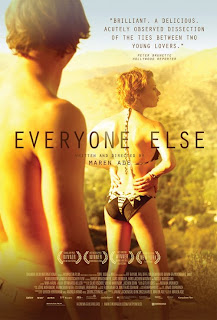 The Disappearance of Alice Creed
The Disappearance of Alice CreedDirected by J Blakeson
This darkly comic abduction-thriller is so matter-of-fact in its details it could function as a how-to: buy this much sound-proofing, this many cell phones, and these kinds of locks if you want to collect the ransom on a rich man's grown daughter. You've seen kidnapping movies before, yeah? But this one, so tightly contained it could be a play, mixes its cliches with upending twists: exploitation turns into empowerment, machismo into homosexuality. It's at times hilariously surprising, but the narrative zags amount to little more than stunt plotting, hustling to sucker-punch a been-there audience. Would that Blakeson had worked as hard to overcome the film's pervasive nastiness or cool misogyny: just because a movie leaves the last girl standing doesn't mean it has undone the beatings and humiliations that led up to it. Co-starring Eddie Marsan, who played the driving instructor in
Happy-Go-Lucky.
 Metropia
MetropiaDirected by Tarik Saleh
This dystopic, animated technonoir traces the development of an ordinarily unhappy everyman into system-smashing revolutionary in a post-peak oil future: Europe—portrayed as smog-shrouded industrial ruins—has been united by a pan-continental super-subway; bicycle riding is illegal. Also, corporations are using shampoo to control minds and the Metro can read your thoughts. Cast in subterranean grey, the animation is very PlayStation, blending hyperreal design with the skittery motion of a
South Park episode. And it's appropriate: the herky-jerky, gloomy-futurist aesthetic is as disquieting as the movie's advertising age conspiracy and surveillance state nightmare.
 Micmacs
MicmacsDirected by Jean-Pierre Jeunet
Jeunet, of
Amelie renown/infamy, delivers another entry in his career-long series of grating Live-Action Cartoons For 11-Year-Olds. This one concerns a gang of junkyard irregulars, consciously modeled on
Toy Story's chestful of oddballs, righteously warring with weapons manufacturers. Its in-your-face whimsy,
Luhrmann-esque tone, and goofy ethic and aesthetic make it triply hard to take seriously its political message about the cruel indifference of arms dealers, their implicit culpability in murder. Jeunet is not without virtues—the film is wordless when it can be, and uses an old Max Steiner score to great effect—but
Micmacs still comes off like
Paul Blart trying to pass as Art.
 Possessed
PossessedDirected by Lee Yong-ju
Lee cut his teeth as an assistant director on Bong Joon-Ho's
Memories of Murder, but his directorial debut shows he learned little from the Korean master: rather than reinvent a genre, Lee cranks out a formulaic blend of two—K-Horror and police procedural—that's efficient in its jolts but less than convincing in its assault on religious devotions, from superstitious shamanist rituals to Christian fanaticism. (The Korean title transliterates as
Hell of the Non-Believers.) Be sure to bring the outrage towards Organized Religion that you cultivated as an adolescent; you'll be rolling your eyes without it.
 Sentimental Engine Slayer
Sentimental Engine SlayerDirected by Omar Rodriguez-Lopez
"El Paso" is credited alongside the actors during the end credits, because this aggressively artsy fever dream is as much a portrait of a place as it is of a person. As unstable as its baby-faced hero (34-year-old Mars Volta guitarist Lopez), the movie is a hallucinatory, logic-less tour through desert roads and houseparties that charts the insecure and frequently violent fantasies of the possibly homosexual virgin: sex, sex, humiliation, retributive violence, and sex. Though essentially about (maybe?) getting a kid laid, it's less
Superbad than a Mexican-American variation of
Loren Cass, with sex replacing race-violence; or, it's like
Donnie Darko without wormholes or rabbitmen.
Read more at
The L Magazine's Tribeca Film Festival Preview
 Producer and existing-franchise exploiter Michael Bay may have settled on a different director to helm his Elm Street
Producer and existing-franchise exploiter Michael Bay may have settled on a different director to helm his Elm Street 

















